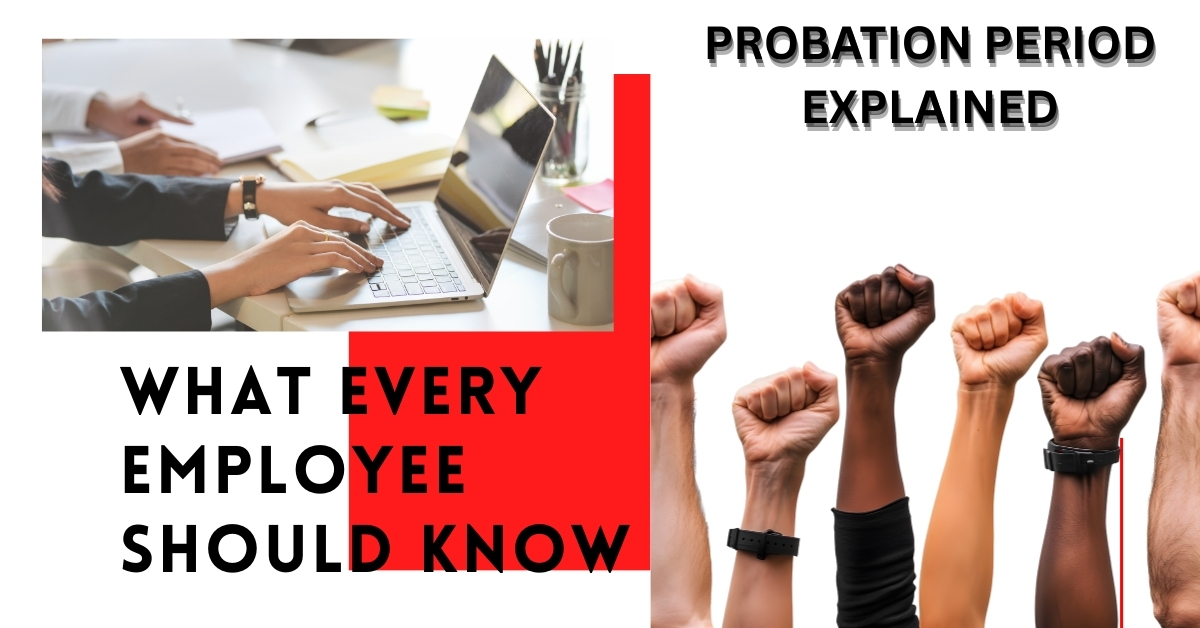Introduction
Probation period rights are one of the least understood aspects of employment law in India’s private sector. While millions of employees join companies every year, very few know the legal position of their status during the probation period. Unlike government employees, who are protected under service rules and regulations, private sector employees often face uncertainty, arbitrary extensions, and abrupt terminations. This blog aims to bridge that gap by examining the concept of probation rights, its legal framework in India, landmark judgments, remedies available, comparative practices in other countries, and recommendations for strengthening employee rights.
What is the Probation Period?
A probation period is the initial phase of employment where an employee’s performance, conduct, and suitability are assessed before confirmation.
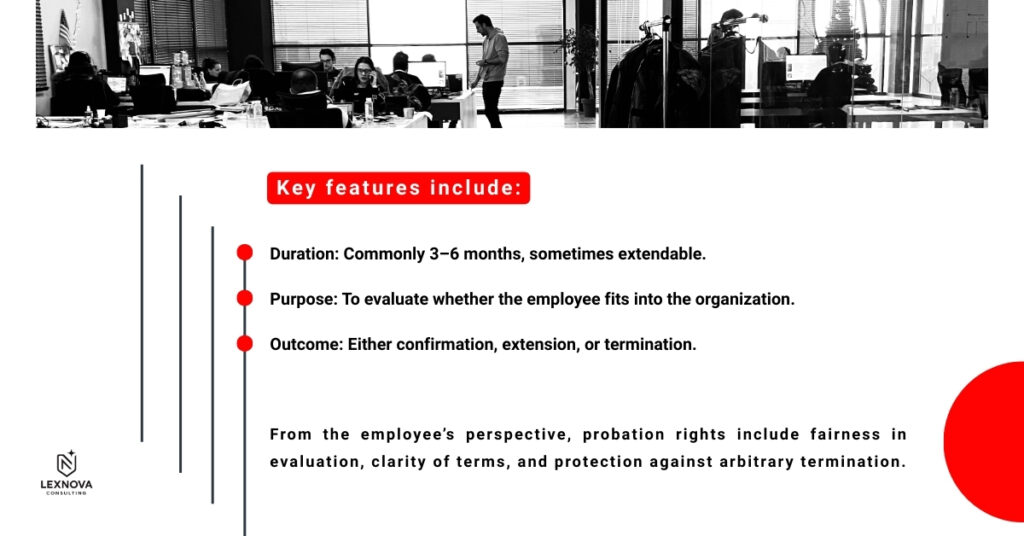
The Legal Vacuum in India’s Private Sector
Unlike public servants covered under Central Civil Services (CCS) Rules or state service rules, there is no dedicated statute protecting probation period rights in the private sector.
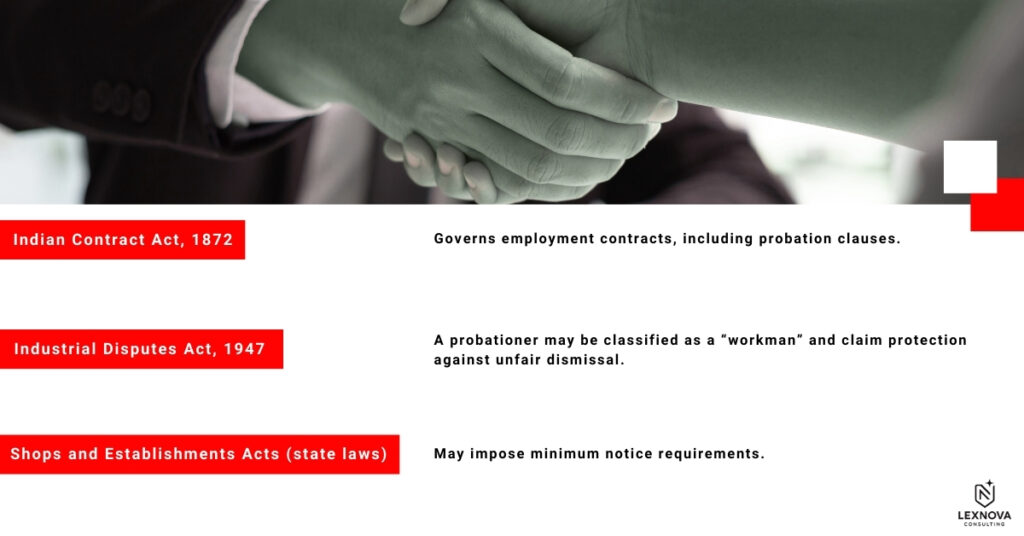
This absence of uniformity creates ambiguity and allows employers wide discretion.
Landmark Judgments on Probation Rights in India
Courts in India have played a crucial role in shaping the scope of probation period rights. Some landmark rulings include:
High Court of M.P. v. Satya Narayan Jhavar (2001)
The Supreme Court held that probationers have no right to automatic confirmation unless expressly provided by the rules. Probation period rights depend on contract terms and employer discretion.
Karnataka State Road Transport Corporation v. M. Boraiah (1983)
Termination during probation was upheld as valid unless proven mala fide. Courts emphasized that employers can discharge a probationer if found unsuitable.
Dipti Prakash Banerjee v. Satyendra Nath Bose National Centre (1999)
Distinguished between “simpliciter” termination (valid) and “stigmatic” termination (requires inquiry). This ruling safeguarded probation period rights from unfairly labelling employees.
Chaitanya Prakash v. H. Omkarappa (2010)
Judicial review is limited in probation termination cases, but courts can intervene where malice or arbitrariness is evident.
State of Punjab v. Dharam Singh (1968)
Extended probation beyond maximum permissible period was held illegal. This principle strengthens probation rights against indefinite extensions.
Common Challenges Faced by Private Sector Employees
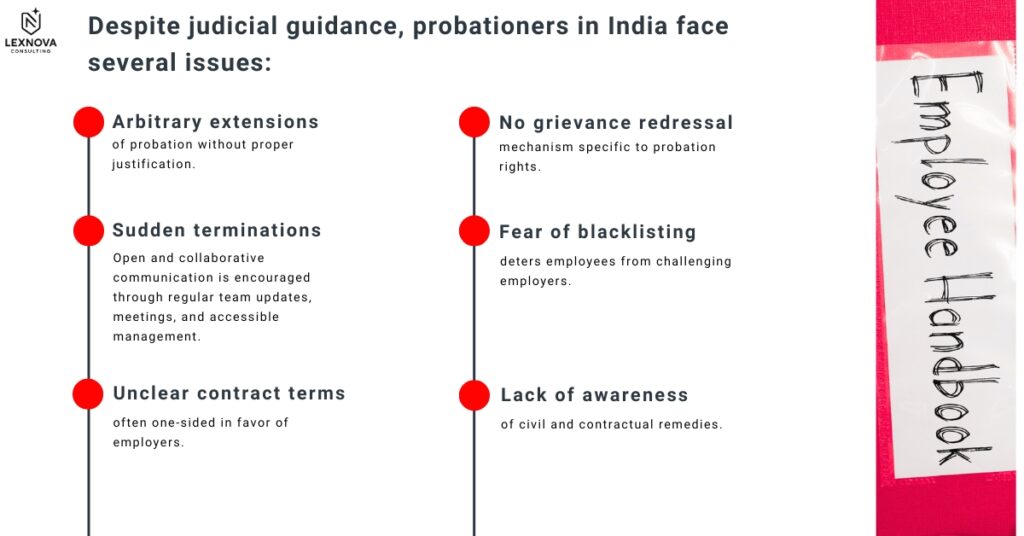
Legal Remedies Available to Probationers
Employees seeking to enforce their probation period rights may rely on:
| 1. Employment Contract Enforcement (Indian Contract Act, 1872). |
| 2. Labour Dispute Redressal (Industrial Disputes Act, 1947) if classified as workmen. |
| 3. Civil Suits for damages in wrongful termination. |
| 4. Writ Petitions under Article 226 against state-affiliated employers. |
| 5. Approach Labour Commissioner under relevant Shops and Establishments Acts. |
While remedies exist, they are often time-consuming and uncertain, highlighting the need for codified probation rights.
Comparative Analysis
India lags behind many countries where probation period rights are clearly regulated.
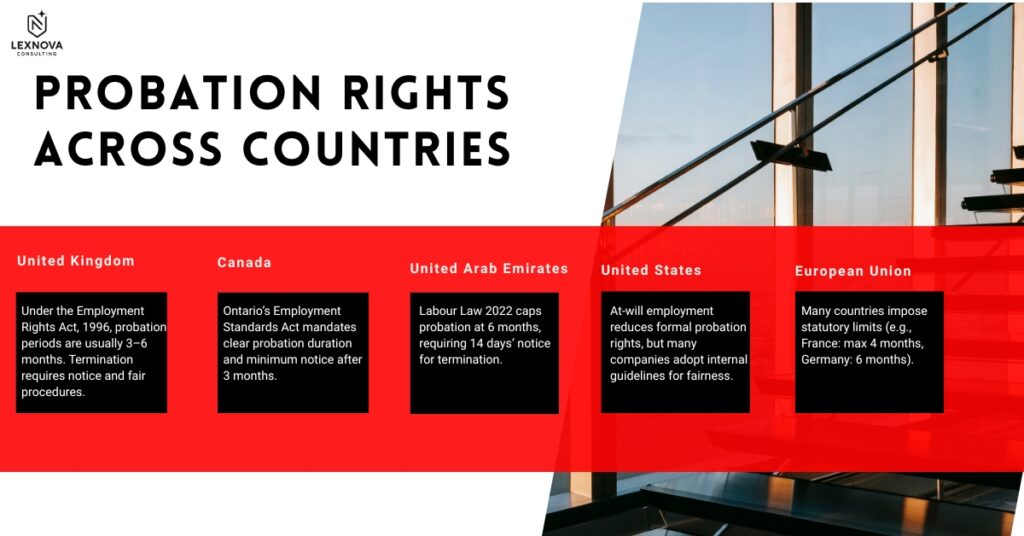
These examples show how codification creates certainty for employees and employers.
Best Practices India Can Adopt
To strengthen probation period rights, India can learn from global standards
| Fix maximum probation period (e.g., 6 months). |
| Require written performance reviews before termination. |
| Impose mandatory notice period (at least 1 month). |
| Recognize probationers’ right to representation. |
| Prohibit indefinite or rolling extensions. |
Practical Advice for Employees
Employees can safeguard their probation period rights by:
- Reading offer letters carefully and clarifying probation terms.
- Negotiating reasonable notice clauses.
- Keeping written records of performance discussions.
- Seeking legal counsel before resigning or challenging termination.
Future of Probation Rights in India
India’s new labour codes, including the Code on Wages and Industrial Relations Code, may indirectly influence probation policies. However, no code explicitly codifies probation rights yet.
Policy recommendation: Introduce a uniform framework under labour laws to standardize probation rights across industries.
Conclusion
Probation is a critical phase of employment, but in India’s private sector, the absence of codified rules leaves employees vulnerable. Judicial pronouncements have offered guidance, but true protection lies in statutory reform. Adopting global best practices and enforcing fairness will ensure that probation period rights become a meaningful safeguard rather than an empty clause in offer letters.
Until then, employees must rely on contracts, civil remedies, and vigilance to protect their interests.
At LexNova Consulting, this initiative is part of our continuous effort to strengthen employee rights in India’s private sector. Since there is no single statute governing issues like probation period rights, notice period obligations, or protections during recruitment, we aim to bridge this gap by providing reliable guidance, case law insights, and practical remedies that employees can actually use. This is our second blog in the series, following our parent blog on Employee Rights in India, and we will continue publishing more resources in the coming months to help employees safeguard their workplace journey without the burden of costly litigation.
We are committed to simplifying complex legal concepts and empowering employees with accurate knowledge of their workplace rights. If you have any questions regarding probation period rights, employment contracts, wrongful termination, or any other workplace issue, feel free to connect with our team.
Explore more insights on employee rights, workplace law, and legal updates by visiting our complete blog library here.
References
- High Court of M.P. v. Satya Narayan Jhavar, AIR 2001 SC 3234
- Karnataka SRTC v. M. Boraiah, AIR 1983 SC 1320.
- Dipti Prakash Banerjee v. SN Bose Centre, (1999) 3 SCC 60.
- Chaitanya Prakash v. H. Omkarappa, (2010) 2 SCC 623.
- State of Punjab v. Dharam Singh, AIR 1968 SC 1210.
- Employment Rights Act, 1996 (UK).
- Ontario Employment Standards Act (Canada).
- UAE Labour Law, 2022.
- Ministry of Labour & Employment, Govt. of India
Disclaimer: The information provided in this blog is for general informational purposes only and does not constitute legal advice. While we have relied on reliable sources such as judgments of the Supreme Court and High Courts, labour codes, and comparative international statutes, the content may not reflect the most recent legal developments. For advice tailored to your specific circumstances, please consult a qualified legal professional. LexNova Consulting is not responsible for any action taken or refrained from being taken on the basis of this blog without independent legal advice.

